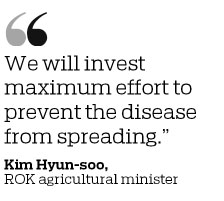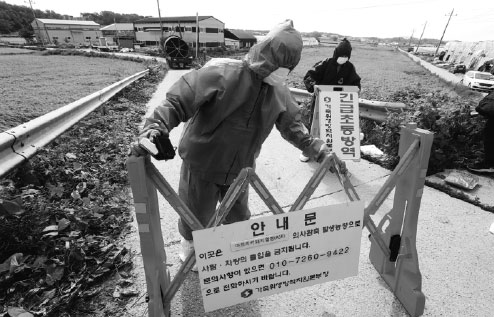ROK culls thousands of pigs after confirming African swine fever
SEOUL - The Republic of Korea is culling thousands of pigs after confirming African swine fever at a farm near its northern border.
Kim Hyun-soo, the ROK's agricultural minister, said the country's first case of the highly contagious disease was confirmed on Tuesday in tests on five pigs that died on Monday evening at the farm in the city of Paju.
Officials were planning to complete by Tuesday the culling of nearly 4,000 pigs raised at the farm and two other farms run by the same family.

No other case has been found yet within a 3-kilometer radius of the farm, which is 2.5 km away from a river that runs across the border with the Democratic People's Republic of Korea.
Right after the confirmation, the ROK Agriculture Ministry raised the warning level to the highest, while issuing a 48-hour standstill order on all pig farms, slaughterhouses and feed factories across the country.
The government also strengthened efforts to disinfect farms and transport vehicles. Under threat is a massive industry that involves 6,000 farms raising more than 11 million pigs.
African swine fever has decimated pig herds in other Asian countries before reaching the Korean Peninsula. It is harmless to people but for pigs is highly contagious and fatal. There is no antidote or vaccine and the only known way to prevent the disease from spreading is a mass cull of affected livestock.
Although this was the first confirmed outbreak of African swine fever in the ROK, the country has battled a number of animal diseases in the past.
In 2014, outbreaks of avian flu in poultry farms resulted in the culling of more than 500,000 birds.
A 2011 outbreak of foot-and-mouth disease resulted in the culling of nearly 3.5 million cattle, pigs and other animals.
"We will invest maximum effort to prevent the disease from spreading, ... we believe the first week (following the outbreak) would be most dangerous," considering incubation periods, the agricultural minister said during a news conference in Sejong City.
"We will quickly complete monitoring inspections at the 6,300 farms (nationwide)... checking each pig to see whether it has fever or not and testing on even the slightest of symptoms," he said.
ROK President Moon Jae-in called for fast and stern quarantine measures to prevent the disease from wreaking havoc on the pork industry, the presidential Blue House said.
The outbreak in the ROK came despite months of heightened monitoring efforts at border area farms.
Kim, the agricultural minister, said at the Paju farm, where the disease has been detected, the pigs were in a sealed indoor facility with no windows and is surrounded by fences to fend off wild boars.
The farm's owner and four Nepalese workers said they hadn't recently traveled outside of the country, Kim said.
The government had placed hundreds of fences and traps around border area farms to prevent pigs from being infected by wild boars. The ROK's military, which had monitored the movement of wild boars through heat sensors installed along the border, said it would be difficult for wild boars to cross over barbed wire fences in the mine-scattered border zone. But government officials have said the animals could possibly swim across rivers.
"We haven't been able to immediately confirm the infection route of the disease," Kim said."We are trying to identify the cause as soon as possible because that would be crucial for preventing the disease from spreading."
Agencies - Xinhua
|
Quarantine officials wearing protective gear place barricades as a precaution against African swine fever at a pig farm in Paju, the Republic of Korea, on Tuesday.Ahn Youngjoon/ Associated Press |
(China Daily 09/18/2019 page11)















